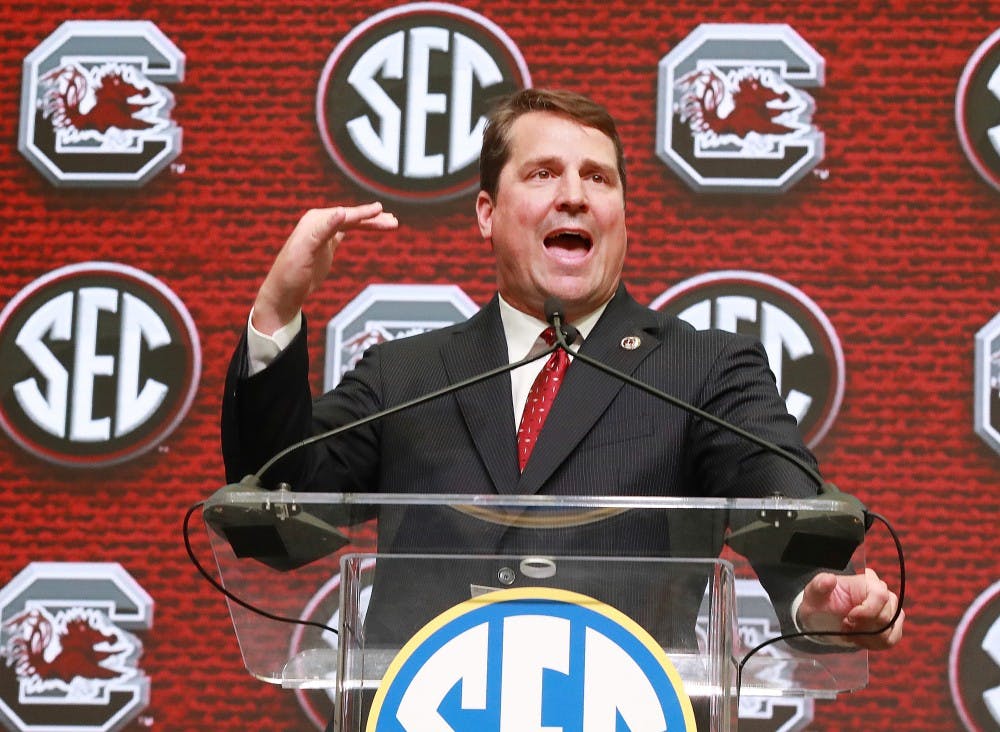In the wake of the shocking death of Maryland football player Jordan McNair, South Carolina coach Will Muschamp came out strongly against the handling of the incident based on a report put out by ESPN. The report, detailing an allegedly toxic environment at Maryland and the culpability of head coach DJ Durkin in the tragic death of McNair, utilized many anonymous sources, something Muschamp took issue with.
For Muschamp, such anonymous sources are not reliable, and to publish information gleaned from such sources is a lapse in journalistic integrity.
University of South Carolina President Harris Pastides sided with Muschamp’s harsh condemnation of anonymous sources in journalism, stating that it’s a policy of the university to treat information submitted anonymously with a certain degree of skepticism. Pastides told The Post & Courier “it’s very, very hard if you don’t have the backing of someone who stands up and says, ‘This is me. I saw it, I heard it, I smelled it,’ to really know what to do”.
While his language was far more subdued than the scathing rantings of Muschamp, who went as far as to call the anonymous sources “gutless,” the message is the same: anonymous sources are to be viewed with suspicion.
With all due respect to Pastides and Muschamp, I disagree with the blanket condemnation of anonymous sources. Anonymous sources, though they do carry with them a certain risk, are an invaluable part of investigative journalism. By allowing a source to remain anonymous, journalists and investigators are able to gather vital information that they otherwise might not be able to, especially if that information is of a particularly sensitive nature.
One cannot imagine, for instance, the Watergate investigation succeeding without the help of the anonymous informant “Deep Throat”, who provided the Washington Post with vital information pertaining to the scandal. Had Deep Throat, later revealed to be FBI Associate Director Mark Felt, been forced to come forward with his real name and face the risks that such a bold move would have entailed, it is unlikely that he would be willing to do so.
Of course, whatever risks that a college football staffer or player might face for coming forward against his head coach obviously pale in comparison to those faced by someone going against President Richard Nixon’s infamous political machine, but there are still good reasons why one might want to remain anonymous.
To come out with damning information on those in any position of power will always entail some form of risk and, as most people are naturally risk-averse, it is only reasonable to allow them the form of protection that anonymity provides. Anyone willing to reveal dirt on a prominent person like Durkin risks anything from ostracization and hostility from the rest of the organization to outright termination if the person they’re exposing is powerful enough.
People tend to be sensitive towards these risks, and thus by allowing them the privilege of anonymity, they might be far more talkative and revealing to journalists than they otherwise might be.
Pastides and Muschamp still do have a point about anonymous sources, in that they can be highly misleading or untrustworthy at times. In the extreme case, such anonymous “sources” can even be outright fabrications of the journalist doing the reporting, as Janet Cooke and her infamous hoax story about a child heroin addict proves.
There is a perfectly legitimate fear that, if people aren’t required to put their names to their testimonies, that falsehoods and embellishments will run rampant. However, as even a cursory glance at the news cycle on any given day will reveal, for any lie told by an anonymous source, there are dozens of on the record lies. One merely has to consult Politifact to see how frequently public figures bend the truth to suit their agendas, proving that tacking one’s name to a statement does not necessarily vouch for the statement’s veracity.
Anonymous sources play an important role in investigative journalism and should not be blithely dismissed out of hand, as Muschamp and Pastides have done. While it certainly is true that anonymous people can and do lie, that alone does not diminish the value of the anonymous informant. When it comes to a situation like the one in Maryland, where jobs are at stake, perhaps some further investigation is necessary to see if any non-anonymous sources are willing to come forward to vindicate the claims. Still, I see no reason to dismiss anonymous sources.

